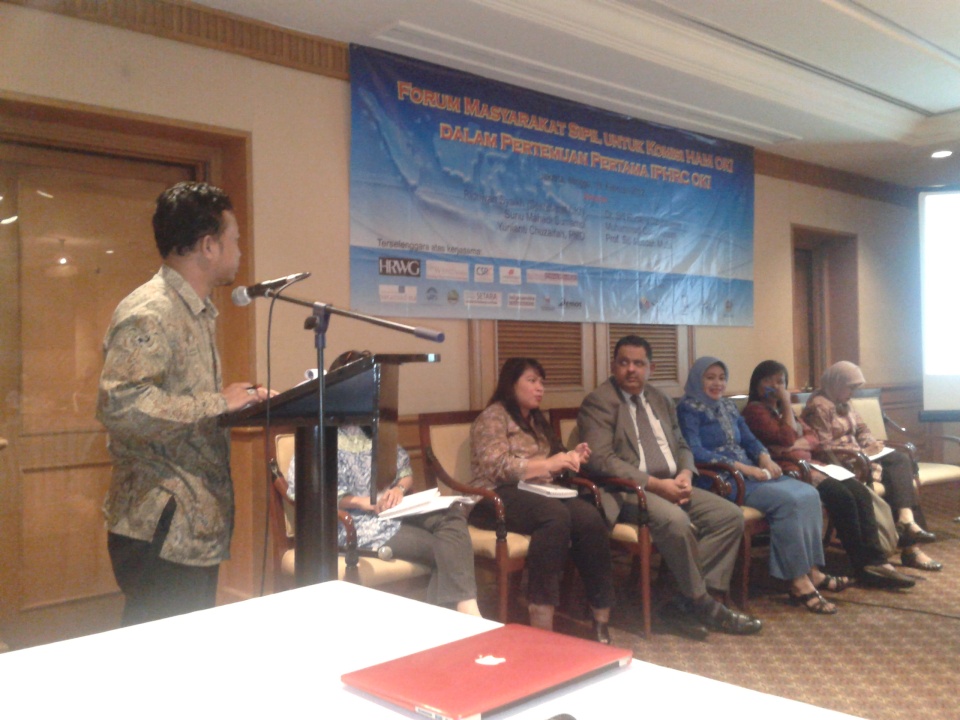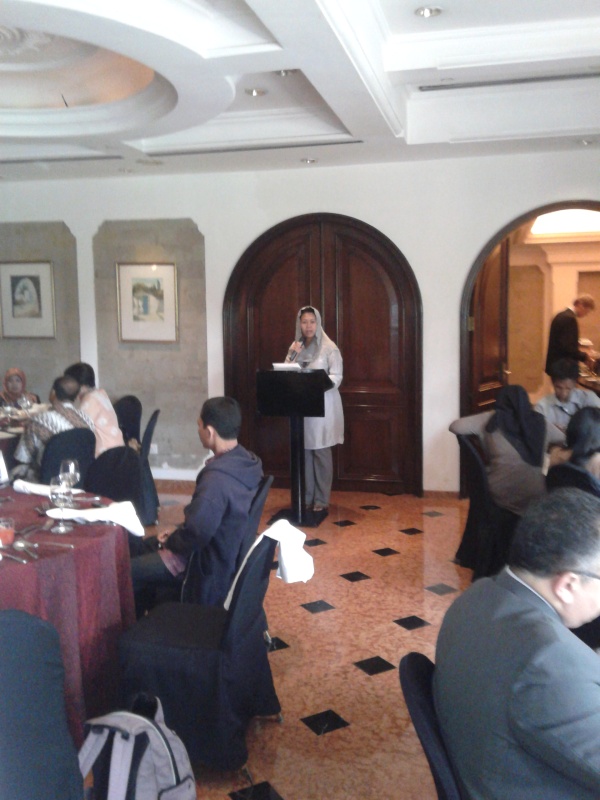INDONESIAN CIVIL SOCIETY RECOMMENDATION
TO THE OIC INDEPENDENT PERMANENT OF HUMAN RIGHTS COMMISSION (IPHRC)
Jakarta, 19 February 2012

We, 34 civil society organizations and universities in Indonesia from Jakarta, West Java, West Kalimantan, East Nusa Tenggara, West Nusa Tenggara, who have attended the meeting of Civil Society Forum for the Organization of Islamic Cooperation (OIC) organized by Human Rights Working Group (HRWG), The Wahid Institute, TIFA Foundation, Setara Institute, Demos Indonesia, Elsam, CSRC, Imparsial, ILRC, UIN Syarif Hidayatullah, and Paramadina University on 19 February 2012, would like to deliver recommendations to the Indonesian Commissioner for the First Meeting of the Independent Permanent Human Rights Commission (IPHRC), which shall be organized in Jakarta, 20-24 February 2012.
We, Indonesian Civil Society, convey our appreciation for the establishment of Independent Permanent Human Rights Commission (IPHRC) of OIC in the 38th Meeting of The OIC Foreign Ministerial Meeting, June 2011. We also appreciate the OIC Secretary General’s effort to organize the first meeting of IPHRC on 20-24 February 2012 in Jakarta, Indonesia. Indonesian Civil Society delivers 5 substantial themes regarding Human Rights issues in the State Members of OIC that should be taken into consideration by the Indonesian Commissioner and IPHRC, i.e. as regards (1) rights of women and children, (2) freedom of expression and opinion, (3) human rights and conflict between Palestine-Israel, (4) inter-faith dialogue, (5) freedom of religion /belief, and (6) rights of migrant workers. Some inputs are also delivered concerning the process of formulating the procedure and mandate of the Commission in the First Meeting of IPHRC.
Rights of Women and Children
1. The importance of protection for women victim of domestic violence and victim of sexual harassment or sexual violence in public domain. In this case, the Commissioners are expected to ensure, that:
a. The State guarantees the protection of domestic violence victims to access legal aid and protection.
b. The State guarantees and provides access of legal process and legal aid, and that victims won’t be criminalized for the testimony they give.
2. Eliminating all forms of violence and discrimination of women in the household, including within it strengthening the wife’s divorce rights (khulu’), prohibition of polygamy, and prohibition of nusyuz practice that has no longer in accordance with the development of times.
a. Eliminating the tradition of female circumcision.
b. The State to providing safe house for women and children victims of violence.
c. Ensuring the accessibility of protection and guarantee of women’s rights in public domain, including women outside their house without mahram; women as leaders and members of parliament; freedom to access education and governance; guarantee to access profession and rights as employee and right of retirement fund insurance.
3. Ensuring the protection for women’s reproduction rights, such as wife’s right to determine the deployment of contraception, consent of abortion for women victim of rape, availability of sexual and reproduction healthiness education for junior and senior high school students with perspectives of women and human rights.
a. Standardizing the age of child as established in the CRC, ensuring the protection of and rights of child to be satisfactorily fulfilled, such as protection of child from sexual harassment, child exploitation, child pornography, and trafficking; guaranteeing the rights of child victim of divorce, rights of child in education, health, including the rights of adopted child; as well as, standardizing the age of matrimony in respect of child to be consistent with the CRC.
b. Ensuring that the State Members of OIC provide and fulfil public facilities exclusively for women and children, for instances: lactation room, children playground in every public area, office, mall, and etc.
Freedom of Expression and Opinion
1. IPHRC must ensure that OIC States protect, fulfil and respect freedom of expression and opinion. Including guarantee freedom of the press, freedom to associate/politic, freedom of thoughts, freedom to express opinion and rights to obtain information.
2. In addition to welcome the condition of civil freedom and democracy in Arab States most recently, in point of fact there are many OIC States that still inhibit the rights to freedom of expression and opinion. The plurality of Muslim society comprised in the OIC ascertaining the existence of this openness and freedom, more to the point the propensity of the society nowadays is increasingly open and global.
3. The freedom of expression and opinion are strongly guaranteed in Islam, therefore IPHRC must also translate these principles into its mandate in the future.
4. IPHRC must ensure that each member of OIC States eliminates practices that obstruct the fulfilment of those rights, among other things are:
- Censorship;
- The arrest of democracy and human rights activist and defender;
- Prohibition of establishment of political party;
- Intimidation;
- Monopoly of media;
- Prohibition of publication (books or other media).
Human Rights, Conflict of Palestine-Israel
1. Making efforts so as to IPHRC delivers recommendations for OIC States concerning the struggle to solve the conflict between Israel-Palestine, by means of:
a. Creating conflict-study on Israel-Palestine as a conflict that is not isolated from other conflicts; and bringing up the roots of problem and facts of violence and human rights violations suffered by civil society in the conflicting communities.
b. Utilizing human rights and humanitarian instruments as reference in formulating the recommendations.
2. Calling for and ensuring that states in conflict (including Israel-Palestine) to implement international human rights laws and humanitarian laws in the area of conflict in order to provide protection for the civil society, especially for children, women and vulnerable groups.
3. Calling for Israel-Palestine states to reinforce law upon violations of human rights and humanitarian laws on the areas within the jurisdiction of the country in respect.
Inter-Faith Dialogue and Freedom of Religion/Belief
In context of inter faith dialogue and freedom of religion/ belief, it is expected that:
1. IPHRC works and implements its mandates in context of freedom of religion and belief in accordance with the principles of Universal Human Rights.
2. Socializing and ensuring the Resolution of UN Human Rights Council on Combating Intolerance, Discrimination and Violence on the Basis of Religion/Belief, which had been proposed by OIC States in 2011, to OIC Member States and guaranteeing the resolution to function effectively.
3. Encouraging the OIC Member States to ratify or create national legal framework that guarantee the spirit of tolerance, respect of each other and freedom of religion/belief.
4. Conducting monitoring and evaluation on the situation of freedom of religion and belief in Muslim countries.
5. Encouraging the establishment of interfaith dialogue in every Member State of OIC.
Rights of Migrant Workers
There are several things that should be taken into consideration of IPHRC in the future regarding the migrant worker issues, both in short and long terms.
1. In the short term, IPHRC is expected to:
a. Build the relationship with OIC parliaments to follow up the Palembang Declaration on Migrant Workers.
b. Ensure that the results of Parliamentary Meeting in Palembang concerning Migrant Workers can be implemented.
c. Organize International Conference on the condition of migrant workers in Muslim States as an effort to solve migrant workers problems.
d. Make the issues of migrant workers as part of IPHRC’s attention.
2. For the long terms agenda, among other things:
a. Originate OIC declaration on the protection of migrant workers.
b. IPHRC develops standard of protection for migrant workers.
c. Encourage OIC States to ratify UN Convention on the Protection of Migrant Workers and Members of Their Families.
General Suggestion concerning IPHRC
1. Conducting monitoring and evaluation of human rights situation in all Muslim states in all Human Rights areas.
2. Supporting, encouraging or providing help to OIC States to establish Human Rights bodies, such as National Human Rights Institution (NHRI).
3. Encouraging OIC States to ratify all major international instruments on Human Rights, to make periodic reports and to follow up the recommendations of the Committee/UPR.
4. Integrating consultation with CSO and opening opportunity for CSO to participate in IPHRC, as part of the procedure of implementing the mandate as the guarantee for the accountability and transparency.
5. Opening opportunity for written inputs of human rights issues in Muslim states as modality for the IPHRC Commissioners in running their function and mandate.
6. Making the international human rights instruments, both Declarations and Conventions, as the basis of IPHRC work.
7. Publishing and socializing the result of study, consultation, and communication of IPHRC with Secretariat of OIC as IPHRC’s accountability and participation of all stakeholders in Member states of OIC.
8. Providing universal and relevant meaning regarding Human Rights and Islam, as an effort to encourage and promote Human Rights in OIC Member States.
Indonesian Civil Society Forum for OIC IPHRC
_____________________________
Secretariat of Indonesia’s Civil Society Forum for OIC IPHRC:
Human Rights Working Group (HRWG):
Indonesia’s NGO Coalition for International Human Rights Advocacy
Jiwasraya Building Lobby Floor. Jl. R.P. Soeroso No. 41 Gondangdia Jakarta Pusat 10350
Phone: +6221 70733505 / +6221 3143015
Fax: +6221 3143058. Email: hrwg@hrwg.org Website: www.hrwg.org





























